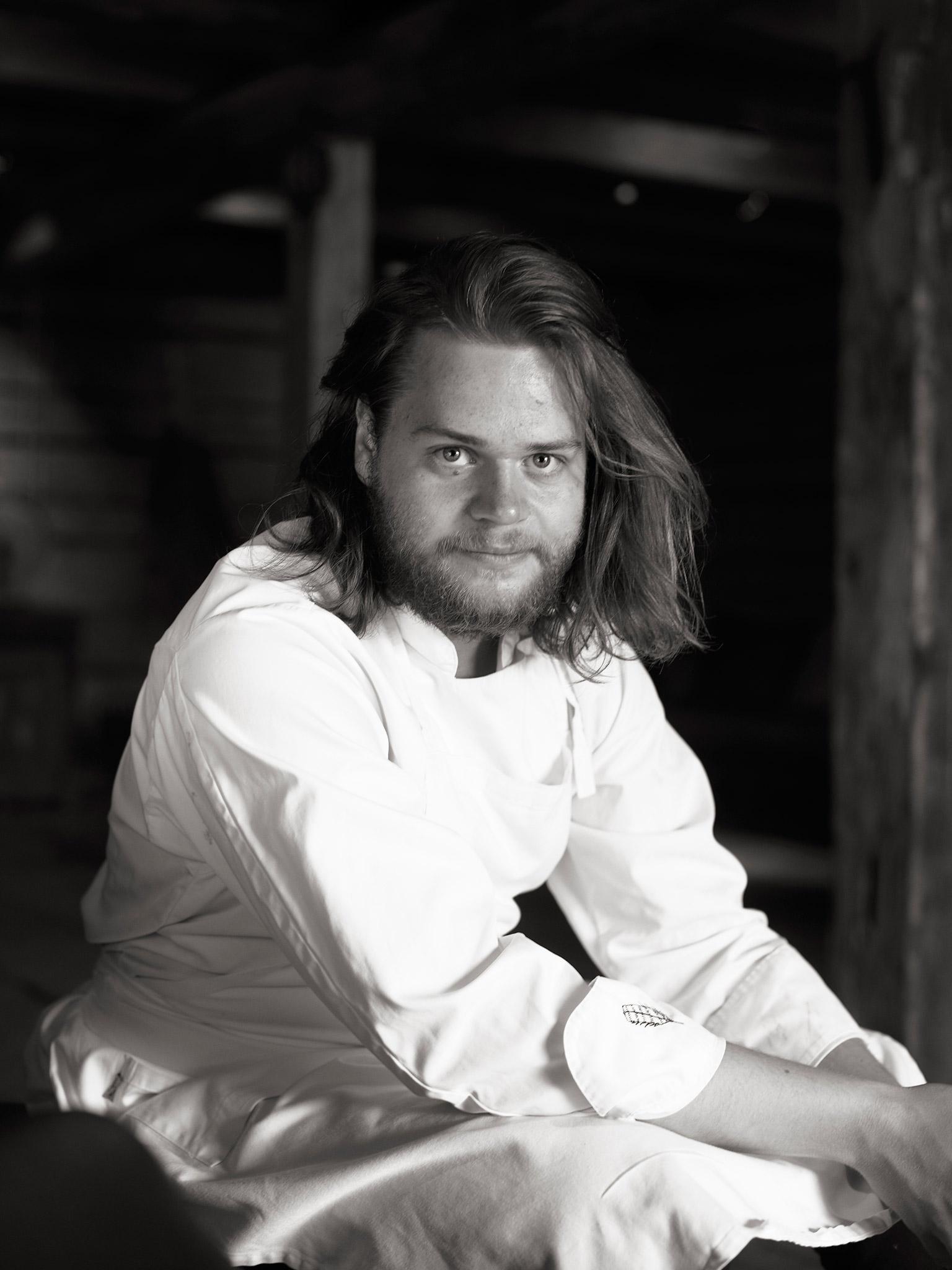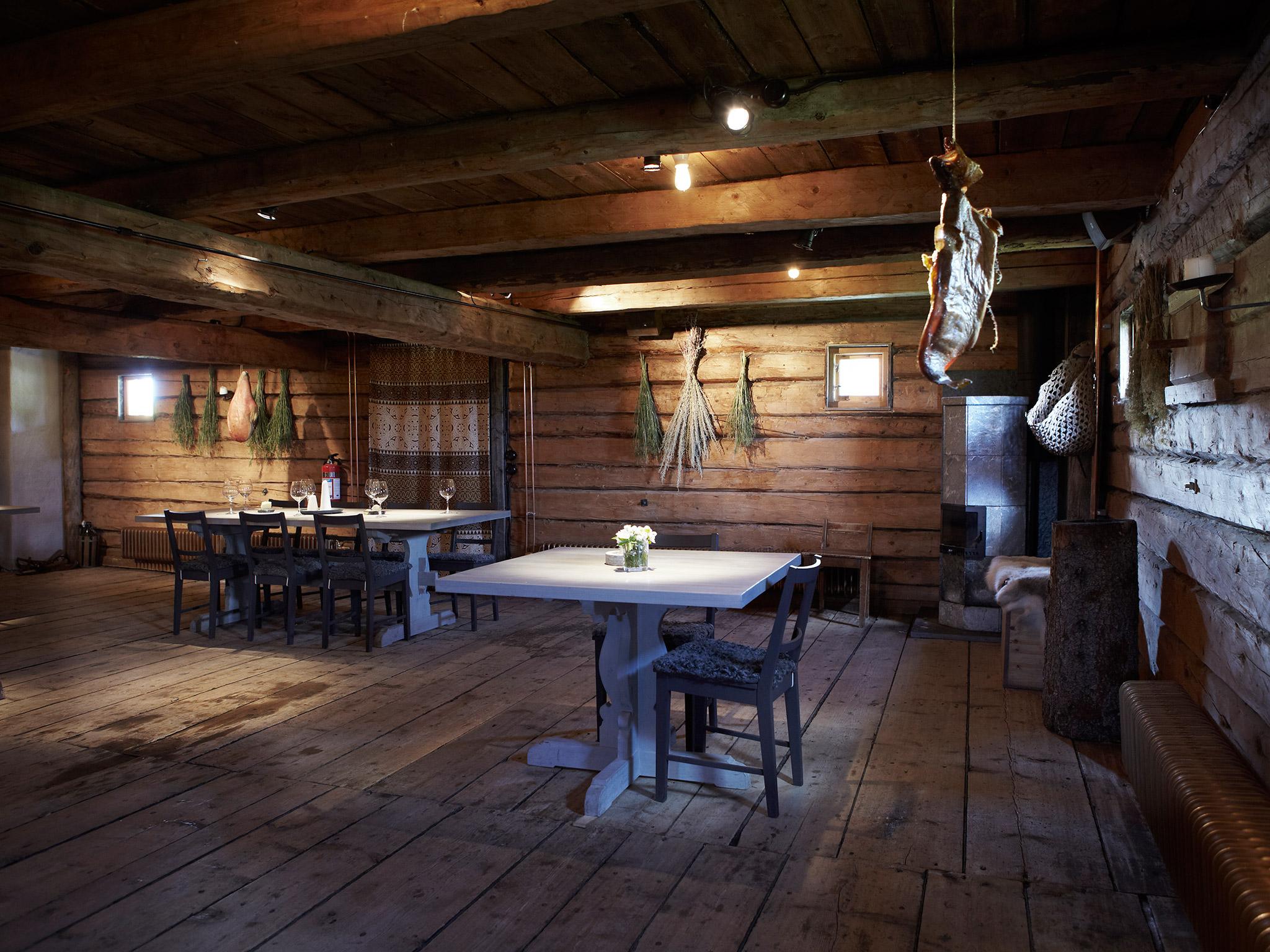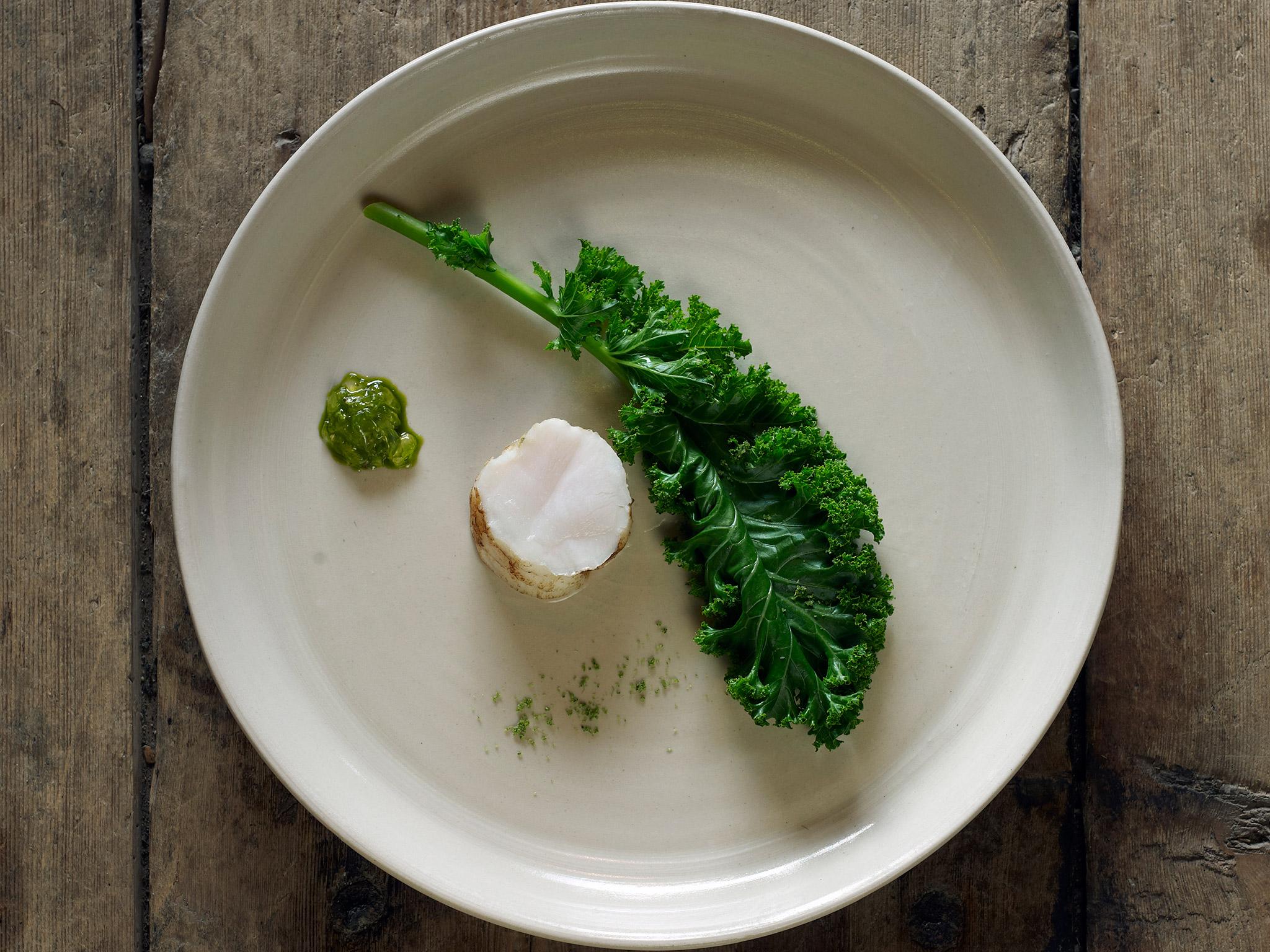The Independent's journalism is supported by our readers. When you purchase through links on our site, we may earn commission.
Magnus Nilsson: The top chef on what he eats for breakfast and the pressure to innovate
Magnus Nilsson's restaurant in the Swedish wilderness has become a must-visit spot for dedicated foodies

Working from a tiny plot of land in a remote part of Sweden, Magnus Nilsson, the head chef of Fäviken, has helped to transform change how Nordic cuisine is viewed across the world.
Opened in 2008, Fäviken is situated in an old barn in Jämtland, 750km north of the Swedish capital of Stockholm. It exclusively uses produce grown on the restaurant's 20,000-acre grounds or very nearby, from fish to beef. The only exceptions are salt, sugar and alcoholic vinegar.
The unique restaurant has become a pilgrimage for foodies, who must book months in advance to dine in a room that only fits 24 guests. Together, they feast on a tasting menu of 32 courses consisting of food grown and cooked by a team of 37 people. A single poached scallop, served inside a shell, on top of a layer of moss, decorated with burning juniper branches is among the dishes that Nilsson is famed for. He also used to saw bone marrow at the centre of the dining room, although he's ditched that, now, alongside his very noisy ice cream machine from the 1920s. A meal at Faviken costs SEK 3,000 (£275), with a wine-pairing service at an additional £160.
Their efforts certainly haven’t gone unnoticed. Nilsson, aged 33, has two Michelin stars, and has been featured in PBS’ 'The Mind of the Chef' and Netflix’s 'The Chef’s Table'. In 2015, he published The Nordic Cookbook: a definitive 700-page tome exploring the region’s varied food.
The Independent spoke to Nilsson about the pressure to innovate and why he's released launched a Chinese pop-up restaurant.
Why did you decide to launch a pop-up when
Basically we were asked if we want to rent this space in Åre for two years. At first I thoguht it’s completely pointless. You can't invest in a restaurant for that long, and I have never felt the urge to have many restaurants. But then I thought that it was a pretty cheap lease and it could be interesting. There are a lot of people who travel to Fäviken and ask what they should do the next day and we didn't have a good answer up until now. Also there are a lot of very capable creative people working at Fäviken. Their personal creativity - even if they are part of the more general creative process - at a restaurant like Fäviken that is highly controlled. It doesn't allow people to be creative in their own way. I thought it would be a welcome and interesting temporary break for staff to run their own restaurant for a few months.
We opened it this winter as a members club. The second one is Hoons, the Chiense restaurant which is run by Ethel, the sous-chef at Fäviken who is Singaporean Chinese. So it’s her heritage. We are going to do three or four more pop-ups before the lease runs out. Then we'll see.
Has she incorporated Chinese cooking into what you guys do at Fäviken for the pop-up?
She grew up with Chinese cooking in Singapore and the team also went over to mainland china to do some research. It's essentially traditional Chinese cooking but with produce that we have access to here. But it’s very recognisable as a Chinese restaurant not a Nordic one.
Fäviken has become a food pilgrimage for a lot of people. For those who don't know, what sort of experience do you try to create for diners?
First of all we want people who come here to have a really good time and to enjoy their evening. It’s extremely important. It’s strange that's something you have to say, but it's something that a lot of restaurateurs forget - especially the ambitious ones. Secondly, we hope they will get a nice contemporary representation of the food culture of this part of the world. And a reflection of the people who work here, including myself.

What are you excited about and experimenting with at the moment?
Hoons has been a big part of the creative process for the past few months and it opened last Wednesday. Now, we can focus on the restaurant again. In a month and a half we are coming into game season which is a very exciting time. This is the time of the year where we have everything in abundance. The garden is exploding with produce. It's a very nice time of year.
Nordic food has become very popular in other parts of the world, do you worry it will get ruined or is it good that this culture is being spoken about more? You see edible flowers in supermarkets these days!
There is barely any point in having an opinion on that. It is what it is. Generally speaking, it’s nice that culture gets spread. But as little as buying a taco kit at Sainsbury's says about Mexican culture it's the same with any culture. You can only experience true food culture where it makes sense. In most cases that's the place of origin. Simply because that’s the reason it's created and shaped in a particular way. It’s a self-limiting problem in that sense.
Have you seen any bizarre incarnations of food that's Nordic that makes you cringe?
I see it all the time but it doesn't make me cringe, I find it fascinating. In the rich parts of the world we thing we’re in control of what we eat but in reality we aren't because we eat what makes sense ot us because of the circumstances of where we live and the way we live our lives. Personal choice is limited. It’s interesting that food culture says a lot about a place. It's one of the most accurate mirrors of society. The idea that we have now that food culture is worth preserving and is very special to your place and shouldn't move around its not easily combined with the way that food culture works.

Is that why you stay so remote? And are there any limitations in being so remote? Do you ever just want to give up and live in a city?
But having some limitations is good for creativity, it should make you want to figure new ways out of doing things. If we have access to everything we want there is no reason to think about new ways of getting something we want.
What are some ways you have gotten over your limitations in a creative way?
Everything that we work with at Fäviken is permeated with that idea but it doesn't mean we limit ourselves all the time. But for example one thing that is very important for me is local vegetables. It’s much easier to get exceptional quality produce if you speak to the person growing your vegetable rather than receiving a box of carrots, being unhappy with them and telling your wholesaler you're unhappy with that box.
That's not going to bring any development. Maybe you get a new box that's better but that's very short term. That is one important think. So that’s a limitation on that side for us. We don't generally use spices very much and that’s not because of cultural reasons. As a country we use a lot of spices in Sweden. We are the biggest consumer of cardamom per capita in the world. All the way since East India company there have been sweet spices in Swedish food culture. So it's part of our culture but I don't cook with spices, I cook but salts as our only seasoning, pretty much, and herbs. And that is something that I've done my whole career. Those ideas come together and you form your own limitations in the way you shape your creativity and the sparks that drive you forward.
In the eight years since you opened, you've been described as a philosopher as well as a chef. Do you feel the pressure to maintain momentum or push boundaries?
Not at all. I run the restaurant because this is my ideal way of working. We have a creative pace that suits us very well. It's slower than some others and a lot faster than others. In eight years the way that works for us has been to focus a lot less on new dishes but a lot more on doing actual real development work by investing in research and developing new techniques. Rather than putting things together on a plate and making new dishes that are only references to other people's creative work. Because I could set the menu in stone now and not change it for ten years and still have customers coming because Fäviken is not a restaurant you go to very often. But that would be incredible dissatisfying for me and the team. And one of the great benefits of running a restaurant like ours is that you get to learn and develop in the field that you enjoy and want to learn more about.

What are you working on at the moment?
For the past few years a very big part of my thought process has been around gardening and vegetables. It has influenced the way we cook more and more, and having it as part of the process of cooking rather than something that produces the product that you're going to cook with.The fact is that you can influence the end result of the dish because we plan so far in advance. In a city restaurant you buy your carrots and put them on the menu. For us, in January we decide which seed we’re going to buy and the variety, where were are going to plant it, how to grow it and harvest it. Ultimately that all informed how it will be serves. That is something I've thought a lot about in the last couple of years. And there are hundreds of research projects to develop techniques from fish to vegetables to herbs. That is ongoing. Vegetables are an overarching train of thought. I think there are several restaurants in the world that have done amazing work of veg. But there are only very few who have actually really incorporated and controlled the whole process into cooking.
Do you hope your research will change food culture and disposable food culture?
It already does, and the fact is that anything anyone does changes food culture. We might do it on a slightly larger scale. We didn't create Fäviken to revolutionise the world of food. I like to think that we are humble enough to understand that's not the way it works. People eat what makes sense to them and what makes that is controlled by much much larger functions than an expensive restaurant in an obscure village in north Sweden.
The more important thing is that we can contribute to a bunch of people’s lives. Every year we exist we have 6,000 customers and I like to think most of them enjoy the experience and we enrich their lives in some way, and the people who work here and the people who deliver to us. And I think that is as much as you can hope for if you want to make some changes. It's very easy when you become famous and people want you to do talks and things like that to overestimate the importance of what you do on a grander scale. But sure, we can all act as role models and affect things on small scale but people eat what makes sense to them. It's not based on how I feel about food or in my grasp to change anything. It's on a much larger scale than that.
What sort of things do you eat at home? Do you eat the same things that you cook?
The kind of thing that we eat at Fäviken and the way it's cooked and presented - it’s very specific to a restaurant because it needs a complex infrastructure and circumstances that only a restaurant like this has. We are 37 employees cooking for 24 guests a night? That is something you can't transfer home and you shouldn't. The values that we incorporate into cooking can be transferred to your home.
This morning I ate a piece of very nice bread toasted with butter and slices of tomatoes form my garden. I don't really eat lunch because we eat dinner very early at 3:30pm, Today I know that it’s pasta with chard.
Do you have any guilty pleasures? Do you ever eat junk food?
No but I enjoy some bad food. If anyone says they don't they are probably full of sh*t or just don't have the taste that corresponds with the rest of us. You have to separate different things with food because I can enjoy certain junk foods in certain circumstances but I can understand this is not something I should eat every day. It’s not good for me and in some case something i shouldn't eat because I don't want to support the way the people who produce it look at food. But you have to keep that separate from the act of consuming in the end if you make the decision to eat something you should enjoy it otherwise what's the point?
Join our commenting forum
Join thought-provoking conversations, follow other Independent readers and see their replies
Comments
Bookmark popover
Removed from bookmarks